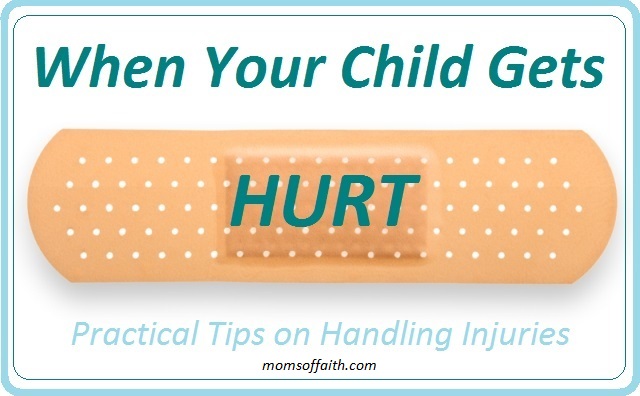When Your Child Gets Hurt – Practical Tips for Handling injuries
I don’t do blood.
I don’t do anything gory at all. Skin is supposed to be on the outside; bones, muscles and organs belong on the inside. When that law of science is broken, a hurricane builds in my stomach and I have to turn away fast. Emergencies and me don’t mix well. Thank God I have a husband who is great at taking charge when things go wrong!
Taking care of boo-boos is part of a mother’s job description.
Here are some practical tips I’ve learned for handling injuries over the years:
1) Be prepared. Accidents will happen. Some children rarely get themselves into compromising situations, but others attract them – like kids to an ice cream truck. So be sure you have plenty of medical supplies tucked away. Keep a first aid kit in your car/stroller/diaper bag/purse at all times. That way when the time comes, you’re ready to tackle it head on.
2) Stay calm. Our children look to us immediately following an accident. We’re their first source of comfort and aid. How you respond will either escalate the situation or create an atmosphere of control. If your facial expression is full of panic (this is typically me!), your child will respond with panic, but if you’re calm, your child will see that you’ll take care of everything. Build trust by reacting in stride.
3) Assess the situation. You need to know how serious the injury really is, or if there is even a mark. Was the child really hurt, or just startled or scared? Usually you can tell by the type of cry you hear. All moms know children have 4 different screams: anger, fear, hurt, and the end of the world. Your next action will depend on the size and type of the injury.
4) Act accordingly. If the child is having a good time and then tripped, he may get back up and move on with life as if nothing happened. (This was a common occurrence with my daughter, who was as tough as a Navy Seal!) If you react with panic every time a child falls or bumps his head, the child will quickly learn that the world is not safe and may become wimpy or fearful. Sometimes you need to just tell him to “brush it off” and get back to playing. This helps children toughen up and accept that a little pain in life is normal.
At times the child will need to seek medical attention. If you have a weak stomach like me, take charge of everything except the injury. Let someone else do that part.
When my daughter’s fingers were slammed in the front door, I couldn’t look. So I grabbed a wash cloth with warm water while my sister examined the wound. I located a favorite blankie to help comfort her and corralled the other children to keep them distracted. Once the injury was wrapped, I held her in the back of the car while my sister drove to the hospital.
But what if the child wasn’t seriously hurt and just wants some attention? No harm ever came from applying a bandage or a kiss for no reason. No need to make a big deal out of it. Just reassure them that you care. If they try to take advantage and keep coming back, you may have to apply a little tough love instead.

